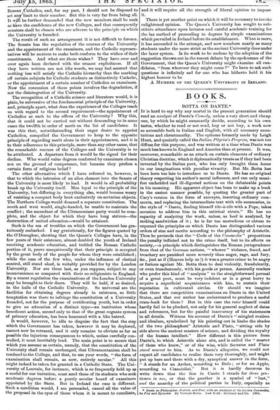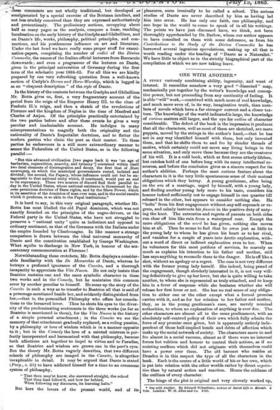BOOKS.
BOTTA ON DANTE.*
IT is hard to say why any mortal in the present generation should read an analysis of Dante's Comedy, unless a very short and cheap one, by which he might summarily decide, according to his own
tastes, whether to read or not read, buy or not buy, a work now so accessible both in Italian and English, with all necessary anno-
tations and chrestomathy. The epitome formerly made by Leigh Hunt, and quaintly called the Italian Pilgrim's Progress, was not too diffuse for this purpose, and was written at a time when Dante was much less known in England and America than at present. It was, moreover, remarkable as an attack on certain elements of ordinary Christian doctrine, which it diplomatically treats as if they had been invented by the Italian poet, who has only brought them home to our imaginations with peculiar vivacity. But Mr. Botta has been born too late to introduce us to Dante. He has no original theory respecting his author's moral influence, and can only mani- fest undecided and ill-digested notions on the debateable points in his meaning. His apparent object has been to make up a book in the easiest manner possible, by quoting the greater part of Cary's version in the form of excerpts, inserting ordinary com- ments, and replacing the intermediate text with vile summaries, in the style of " Dante, finding himself tete-a-tete with a Pope, takes
occasion to address him in this satirical strain." He has no capacity of analyzing the work, unless, as beef is analyzed, by
making sandwiches of it ; he is far too unstudious or obtuse to
expound the principles on which Dante has distinguished various orders of sins and merits according to the philosophy of Aristotle.
Thus he pretends that the " Code of the Commedia" proportions the penalty inflicted not to the crime itself, but to its effects on society,—a principle which distinguishes the Roman jurisprudence
from that of the German nations, " whence " violence, fraud, and treachery are punished more severely than anger, rage, and fury, &c., just as if (Heaven help us !) it was a greater crime to be angry or furious against Mr. Botts than to deal violently, fraudulently, or even treacherously, with his goods or person. Assuredly readers who prefer this kind of " analysis " to the straightforward perusal of a great poet, must be very indolent or in a great hurry to acquire a superficial acquaintance with him, to sustain their reputation in cultivated circles. Or should we imagine that there are competitive examinations on Dante in the United
States, and that our author has endeavoured to produce a useful cram-book for them ? But in this case the tutor himself could
hardly fail to be plucked, not only for his general neglect of dates and references, but for the painful inaccuracy of his statements in all details. Witness his account of Dante's " mingled realism and idealism, symbolized by his pointing out in limbo the shades of the two philosophers" Aristotle and Plato, "sitting side by side above the ancient masters of science, and dividing the royalty of the human intellect." How different is this picture from Dante's, in which Aristotle alone sits, and is called the " master of those who know," or of the wise, while Socrates and Plato
stand nearest to him. As to Dante's allegories, we could not expect all candidates to realize them very thoroughly, and might put up here and there with a dry, synoptical answer in the form,
" A stands for an Archer, according to Bufo ; or for an Apple, according to Cianciolini." But it is hardly decorous to
write down that the lion in Canto 1 stands for three gen- tlemen in one, or that the panther is a symbol of "lust," and the anarchy of the political parties in Italy, especially as
• Dank as Philosopher. Patriot, and Poet, with an Analysis of the Diana Coo media, Its Plot and Episodes. By Viceuzq Botta, New York: Scribner and Co. 1865.
these comments are not wholly traditional, but developed or amalgamated by a special exercise of the Bottrean intellect, and not less crudely conceived than they are expressed authoritatively and pretentiously. The preliminary sections, occupying about half as many pages as the analysis, compose a loose, rambling
lucubration on the early history of the Guelphs and Ghibellines, and on Dante's life, works, philosophy, political principles, and con- nections, and his posthumous influence on art and literature. Under the last head we have really some proper stuff for exami- nation-papers, comprising the number of coded of the Divina Commedia, the names of the Italian official lecturers from Boccaccio
downwards ; and even a programme of the lectures on Dante, given in the principal universities of Germany during the first
term of the scholastic year 1864-65. For all this we are kindly prepared by one very refreshing quotation from a well-known section of Carlyle's Heroes and Hero-Worship, which is lugged in as an " eloquent description " of the style of Dante.
In the history of the contests between the Guelphs and Ghibellines Mr. Botta gives us, first, a very fragmentary account of the period from the reign of the Emperor Henry III. to the close of Frederic II.'s reign, and then a sketch of the revolutions of Florence and the kingdom of Naples in the time of Manfred and Charles of Anjou. Of the principles practically entertained by the two parties before and after these events he gives a very peculiar and inadmissible account. He indulges in many misrepresentations to magnify both the originality and the nationality of Dante's Imperialist doctrines, and to flatter the modern parties who claim the poet as their master. To these parties he endeavours in a still more extraordinary manner to annex the Federalists of the United States, as in the following parallel :—
"But this advanced civilization [two pages back it was 'an age of barbarism, superstition, anarchy, and tyranny'] contained within itself two fatal elements of disintegration and decay, the first that of State sovereignty, on which the municipal governments rested, isolated and divided; the second, the Papacy, whose influence could not but be an- tagonistic to that national unity which, if continued, would put an end to its supremacy. These two sources of discord find their parallel to- day in the United States, whose national existence is threatened by the same pernicious doctrine of State rights, and by the Slave Power, which in its assertion of the dominion of man over man, and in the social results which it produces, is so akin to the Papal institutions."
It is hard to say, in this very original paragraph, whether Mr. Botta has most libelled the old Papal dominion, which was not exactly founded on the principles of the negro-drivers, or the Federal party in the United States, who have not struggled to preserve a " national unity " quite as indistinct and opposed to ordinary sentiment, as that of the Germans with the Italians under
the empire founded by Charlemagne. In like manner a strange comparison is drawn between the ideal universal monarchy of Dante and the constitution established by George Washington. What squibs to discharge in New York, in honour of the sex- centenary commemoration at Florence !
Notwithstanding these crotchets, Mr. Botta displays a consider-
able familiarity with the De Monarchia of Dante, whereas he betrays a profound ignorance of the Convito, and a thorough incapacity to appreciate the Vita Nuova. He not only insists that Beatrice sustains one and the same symbolic character in these two works and in the Comedy, but he maintains this common error by another peculiar to himself. He sums up the story of the Convito in such a way as to transfer to Beatrice all that is said of a personage mentioned beside her, and evidently distinguished from her,—that is, the personified Philosophy who offers her consola- tions to the bereaved lover. Thus he shuts his eyes to the diver- sity of the predominating sentiments in the three works (as far as Beatrice is mentioned in them), for the Vita Nuova is the history of a simple personal attachment ; in the Convito we see the memory of that attachment gradually replaced, as a ruling passion, by a philosophy or love of wisdom which is in a manner opposite to it ; but in the Comedy the love of a sainted mistress is per- fectly incorporated and harmonized with that philosophy, because both affections act together to impel to virtue and to Paradise, so that Beatrice and wisdom are grown one in the poet's eyes. But the theory Mr. Botta vaguely describes, that two different schools of philosophy are imaged in the Convito, is altogether inexplicable in detail. It may be argued that Dante is stated (Purg., c. 33) to have addicted himself for a time to an erroneous system of philosophy,
" That thou may'st know, she answered straight, the school That thou hut follow'd, and how far behind, When following my discourse, its learning halts."
But here the lovers of the present world, and of its
pleasures, seem ironically to be called a school. The serious studies of Dante are never described by him as having led him into error. Ile has only one faith, one philosophy, and one hope in the world to come to speak of in all his writings. The points we have just discussed have, we think, not been thoroughly apprehended by Dr. Barlow, whom our author appears to have consulted on them with some deference, as from his Contributions to the Study of the Divina C'ommedia he has borrowed several ingenious speculations, making up all that is worth reading under the heading of " Dante as a Naturalist." We have little to object to in the strictly biographical part of the compilation of which we are now taking leave.































 Previous page
Previous page